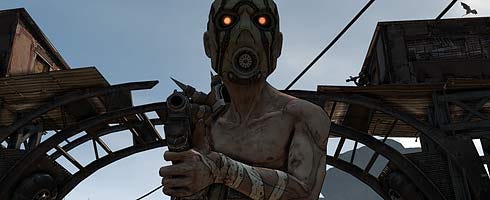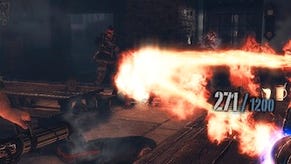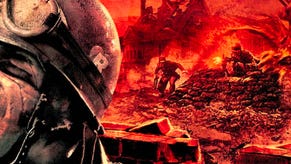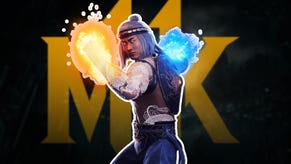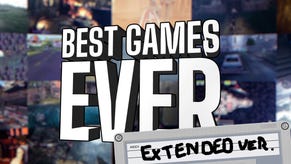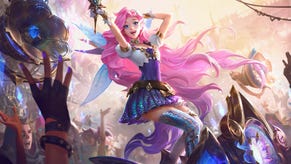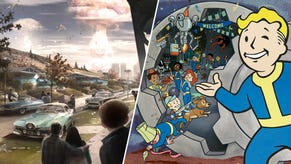Interview: Gearbox on Borderlands 2, Pitchford's Valve remarks and tons more
Gearbox is very much in its moment. While Modern Warfare 2's relentless brass-ejection had many of 2009's biggest potentials running into next year's first quarter, the Texan developer and publisher 2K stood ground and went ahead with a new, Q4, core IP release in Borderlands: the gambit resulted in stock shortages and open water to enjoy sales on what's been universally tagged as an excellent game.
Borderlands' release was well judged, and merely capped off a year in which Gearbox has managed to maintain near constant media presence, most recently throwing itself jazz-handedly into the limelight with contentious remarks about Valve and Steam from boss Randy Pitchford - Mike Neumann, creative director, tells us below that Pitchford's words were "twisted and contorted".
And don't forget Aliens. Or Brothers in Arms. VG247's Nathan Grayson didn't: see how Neumann answered his questions after the break.
VG247: Concerning Borderlands’ future DLC episodes, do you have any plans to increase the game’s level cap or add new talents and talent points?
Mike Neumann, creative director: We’re not ready to announce anything on level caps right now. Sorry. Good question! But I can’t announce anything right now. We’ve been pretty radio silent on DLC.
OK then, how about loot drops? Borderlands, by and large, rocks ultimate, but the loot that drops off bosses has been bothering me a bit. It’s generally either a “special” named item, but most of the time, it’s just a little bit of money and nothing more. Other games in Borderlands’ vein (Diablo, etc.) treat bosses as a sort of catharsis, with gobs of loot making everything worth it. Why did you choose to prioritize Borderlands loot system in such an atypical manner?
Well, we wanted to make sure that we could have every boss drop one really awesome thing, and then if you wanted more of that, you could just grind the boss. Most bosses do tend to drop more than one item, though. There’s a chance they’ll drop a bunch of purples. It’s certainly not quite World of Warcraft, where you have to raid for two hours just to get to the good loot. We wanted the good loot to always be present. Like, you can kill anything and have a chance to get some legendary item.
Borderlands has really taken off. I mean, there are shortages at retail stores! Which doesn’t happen all that often with games these days. Where you expecting the game to be this popular?
Man, I don’t think anybody was. Those don’t happen in the videogame industry very often – where people can’t find your game. Like, even today, I’ve been seeing reports of shortages. We’re shipping as many out to retailers as we can. Some retailers have restocked three or four times already. So we’re loading in as fast as we can. But it certainly doesn’t suck to be the people who made the game you can’t keep in stock.
Despite your stern warning, and despite the fact that you’re one of the diabolical minds behind a game with more deadly implements than any other game ever, I’m going to try and sneak in one more question about the DLC. How long have you been working on the Zombie Island of… which Doctor is it again?
The Zombie Island of Dr. Ned, who is totally not related to Dr. Zed [laughs]. I wrote the script for that… man, it was last month. We went really fast on that. It was, like, once the game was almost all the way through certification, we started working on [the DLC].
We basically just killed ourselves to make some additional content for people, because, I mean, right now, if you look around, there are already people who are like, “I’m level 50 because I haven’t stopped playing for three days straight!” We’re kind of bending over backwards and killing ourselves a little too much to try to satiate that need for more Borderlands.
Which is really cool! It’s just kind of scary when people want content that badly.
One of my favorite aspects of Borderlands was the sense of chaos its battles conveyed. People and not-people are everywhere, running and – especially – screaming. It’s very loud, is what I’m trying to say. How much of a focus went into Borderlands’ sound design?
It was definitely a huge factor. We wanted the music to be cool. We wanted the dialogue to… well, there’s dialogue in the game that’s, like, super-cheesy. I mean, the low-level bandits – we kind of imagine them sitting around all day thinking, “Aw, I’m gonna get an insult!” and they finally get up and they’re like, “It’s time for my pound of flesh!” And you’re like, “What the…?” and you just shoot them because you’re thinking, “That’s the lamest thing I’ve ever heard.”
With other ones, we tried to find different methods. Like with Sledge, dude’s just crazy. He’s like, “Me hit hammer!” and that whole bit. We wanted to differentiate and make them fun to kill. And [all the while] you’re like, “These guys are all idiots!” [laughs]
I guess it’s a bit early to ask this, but Borderlands is really successful at the moment. Is there any chance of a Borderlands 2?
Yes, I can probably confirm that there’s a chance of a Borderlands 2 [laughs]. I mean, with anything, especially a new IP, if people want more and you can make more, and everybody can make money and do good business there, it obviously makes really good sense to do that. Obviously nothing so far is planned. We’re working on DLC. We haven’t really had any talks about a sequel, other than water cooler talk like, “Wouldn’t this be cool” kind of stuff.
But yeah, Borderlands is really exciting. Everyone here loves the franchise, and it seems like the public is really coming back with praise and love. So yeah, if everything makes sense, Borderlands 2 seems like a no-brainer to me.
What are the chances of a post-launch Borderlands demo?
At one point, we did come up with an idea for a demo. And it was eight hours long. I mean, if you look at the beginning content for the game – which is the most logical place to do a demo – we were like, “Oh, you can do this, and you can kill [early game boss] Nine Toes!” And there were enough quests where it felt safe, but it was like giving away a whole game’s worth of content for free. Which is a little sketchy. It’s a little hard to make that decision and pull that trigger. Which is not to say that we won’t. We’re still trying to figure out a really smart way to do a demo.
Borderlands is just such an expansive game. So many things can happen at any time. It’s really hard to truncate that down to some bite-sized, “Here’s why you should buy the game” section.
I’m hoping that people are giving each other demos. Skeptical friends are coming over and checking out the game in split-screen, and maybe getting a demo that way. Because word-of-mouth has just been nuts since the game came out.
Borderlands runs on Unreal Engine 3, which is interesting, because it certainly doesn’t look any other UE3 game I’ve ever seen. It doesn’t have that grimy, industrial, post-apocalyptic-y UE3 “look” to it. How difficult was it for you to overcome what appears to be a stumbling block for other developers? Is it inherently difficult to steer UE3 in different visual directions, or are some developers slacking off a bit in the aesthetic department?
It was really difficult. I think a lot of people would point out that it’s the art style that makes Borderlands feel different; that’s kind of a no-brainer there. But, the really key factor there is the real-time lighting. There’s no baked-in lighting. It’s real-time all the time. Which gives it that really high-contrast, colorful look. Sometimes, in other Unreal 3 games, you see that kind of muted, grayish, kind of blandly light-mapped look, and we wanted to avoid that. And it’s not that that’s bad. It works in a lot of realistic games. But Borderlands is supposed to be, like, in-your-face and we wanted to do day-and-night cycles and stuff like that – which is just not possible without some really crazy lighting code.
Recently, a bunch of publishers pushed some of their biggest games into 2010, which didn’t go over to well with fans – at first, anyway. For the games that decided to stick it out in 2009, though, the relative lack of competition probably doesn’t hurt. Do you think Borderlands benefitted from this? How do you think Borderlands would’ve fared if it’d gone toe-to-toe with Bioshock 2, Mass Effect 2, and other such heavy-hitters?
Well, I think it’s pretty clear that they were all scared of us, and they ran away. I mean, there was some other “Modern Something” game coming out, but clearly it was us [laughs].
Yeah, I mean, you look at any launch window and it can be scary. It’s funny; everyone talks about Christmas being the scary time to launch a game, but it looks like March now. But all of those games are sequels, and that’s the thing. With a non-sequel/new IP, sometimes it doesn’t really matter when you release it. You just have to drum up the noise. And I mean, there’s so much noise all the time in the videogame industry that just getting people to look [at your game] is hard.
So I think it was good that we sat on the art [style] change as long as we did. [It was like] boom, screenshot, and everyone was like, “What just happened?” and then at E3, we were like, “Here’s the game!” and they were like “WHAT?!” And it was like that all the way to launch. It was this really short window of time to market where we just kind of hit everyone as fast as possible to get them talking.
But yeah, if the holiday was more crowded, that would be scarier, because there’d be more games, and everyone would have to split it more ways.
Borderlands is your second internally developed IP. What lessons did you learn from creating the Brothers in Arms franchise, and how did you apply them to the development and marketing of Borderlands?
We definitely did more of own marketing on Borderlands. We wanted to set the tone of the trailers internally, to match the tone of the game – a sort of devil-may-care attitude. I mean, everything’s so serious. And I think that’s a good lesson we did learn from Brothers in Arms: Hell’s Highway is that you can make a game that’s too serious. And if everyone’s coming into videogames to get some escapism – some fantasy fulfillment – it can be a little heavy on them. And that’s true with a lot more than just the stuff we’ve done. Yeah, definitely don’t take ourselves too seriously, and just try to make games that are all about having fun.
Speaking of Brothers in Arms, someone in Gearbox – I’m drawing a blank on who, at the moment – mentioned that Gearbox will probably revisit the Brothers in Arms franchise at some point in the future. Do you think that you’d ever consider moving BiA out of WWII and into a modern setting?
I don’t think it’s a never-say-never thing, but – without confirming or denying anything – we didn’t quite finish out the story of Baker and his squad, and it seems logical that we might revisit that in the future. I hope we do, personally. But time will tell, obviously.
Can you say anything about how Aliens: Colonial Marines is coming along?
Um, it’s coming along [laughs].
Because I know Randy Pitchford said that if enough people pester him about the game, he’ll eventually break. Or Sega will.
Sega’s actually here [in the offices] right now. I’m not gonna tell you who they are or where they are, but they’re here. Too bad your [press] badge doesn’t get you onto that floor [laughs].
So, how about Duke Begins? Are you allowed to say anything about that, or have your lips been completely sealed by the U.S. court system?
No, absolutely not! There’s a court battle going on [laughs]. As much as I want to say anything that’ll get me subpoenaed, no thank you. We are not talking about that at all, obviously.
Speaking of things that can get people killed or subpoenaed, I was actually afraid that this whole interview thing was an elaborate trap – perhaps with snipers and the like. After all, I also work with Maximum PC, and we recently published an interview with Randy during which he went off on Valve’s “conflict of interest” that has arisen from its status as a developer and an online storefront.
Well, we’re actually going to gas this room in a second.
Yeah, I sort of figured. It’s all too convenient. As my final will and testament, though, I pose this question: Did Valve get in touch with Gearbox at all over Randy’s comments?
I wouldn’t be surprised if they got in contact with him.
Thing is, it was really out-of-context. There is absolutely no bad blood there. We love Valve. We love Steam. We’re doing good on it right now. It’s a really great platform. [Randy] was simply making a sidenote. Like, “Hey, they’re a developer, and they also self-publish. There might be a conflict of interest there.” It’s not like I disagree. There might be conflict of interest there. We haven’t seen any evidence. It’s all on the honor system. But it is a bit like, “Hey, let’s at least acknowledge that we’re all on the honor system here.” It’s a little sketchy.
I think the comments about exploiting developers really just got twisted and contorted. I think [Randy] was trying to stick up for the little guys a bit, and it was cool to see all the indie developers that have been using Steam as their platform come out and say Steam’s awesome. And it’s like, ok, the honor system’s working and everybody’s doing well. So really, all we proved is that Valve’s good people, and this is working out. So we’ll stick with this.
Just out of curiosity, why was the PC version of Borderlands released a week later than its console counterparts?
There were some optimizations to make. Thing is, when you’re certifying three platforms at the same time, your sur-processes are very different. PC, a lot of times, doesn’t have one. It’s a publisher-driven sur-process to make sure that it’s a quality product. And Xbox 360, you’re putting in the pipeline early, and PS3, you’re putting in the pipeline early. If you hit late on one of those, it’s gonna push out your PC version. There’s a lot of stuff that can happen, and I’m surprised it was only a week, to be honest. That could’ve been a lot worse. It’s like suicide hitting on three platforms at the same time. They’re widely divergent things. You deal with memory in completely different ways.
So this pretty much throws out the PC gamer conspiracy theory that later PC launches exist to somehow benefit console sales, huh?
There’s no conspiracy. We could’ve released [the PC version] two weeks earlier and the console versions still would’ve sold better. That’s just the nature of that economy right now. PC piracy is the most widely prevalent form of piracy in games. That’s gonna bring your PC sales down. People find it cheaper to play on Xbox 360, and it’s more fun to sit on their couch with their TV. That’s also gonna drive down PC sales.
A week delay isn’t going to do anything. Gamers are gonna play where they want to play.
